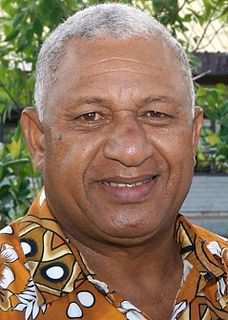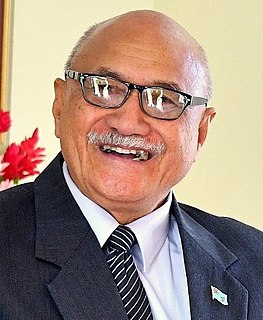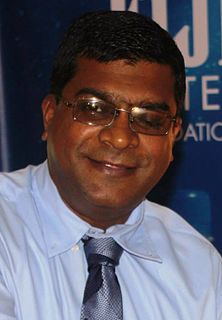| |||||
| Decades: | |||||
|---|---|---|---|---|---|
| See also: | |||||
Events in the year 2018 in Fiji .
| |||||
| Decades: | |||||
|---|---|---|---|---|---|
| See also: | |||||
Events in the year 2018 in Fiji .

The President of the Republic of Fiji is the Head of State of Fiji. The President is appointed by the Parliament of Fiji for a three-year term under the terms of the 2013 Constitution of Fiji. Although not entirely a figurehead, the President's role in government is mostly ceremonial, but there are important reserve powers that may be exercised in the event of a crisis. In addition, the President is Commander-in-Chief of the Military Forces.

The Prime Minister of the Republic of Fiji is the head of government of Fiji. The Prime Minister is appointed by the President under the terms of the 2013 Constitution of Fiji.

Josaia Voreqe Bainimarama CF, MSD, OStJ, known commonly as Frank Bainimarama and sometimes by the chiefly title Ratu, is a Fijian naval officer and politician who has been Prime Minister of Fiji since 2007. He was the Commander of the Fijian Military Forces from 1999 to 2014. While holding the office of Prime Minister, he has temporarily held various ministerial portfolios: Information, Home Affairs, Immigration, Public Service, Indigenous and Multi-Ethnic Affairs, Finance, and Foreign Affairs.

Konisi Tabu Yabaki was a Fijian politician from the southern Kadavu Island. He served in the Cabinet from 2000 to 2006, but lost his portfolios as Minister for Fisheries and Forests after the parliamentary election of 6–13 May 2006. He was subsequently appointed Chairman of the parliamentary committee on Social Services.

The Cabinet of Fiji is the Fijian Government's body of Ministers. It is appointed by the Prime Minister of Fiji and responsible to the Parliament of Fiji. The Cabinet's constitutional basis is sections 90 to 96 of the 2013 Constitution of Fiji.
The Republic of Fiji Military Forces (RFMF) is the military force of the Pacific island nation of Fiji. With a total manpower of 3,500 active soldiers and 6,000 reservists, it is one of the smallest militaries in the world, though most of its surrounding island nations have no militaries at all. The Ground Force is organised into six infantry and one engineer battalions, with approximately 6,000 reserves. There was formerly one "Zulu" company of counter-revolutionary specialists, which was deactivated in late 2000 due to a mutiny by some of its members.

Fiji has experienced many coups recently, in 1987, 2000, and 2006. Fiji has been suspended various times from the Commonwealth of Nations, a grouping of mostly former British colonies. It was readmitted to the Commonwealth in December 2001, following the parliamentary election held to restore democracy in September that year, and has been suspended again because of the 2006 coup, but has been readmitted a second time after the 2014 election. Other Pacific Island governments have generally been sympathetic to Fiji's internal political problems and have declined to take public positions.

Fiji, officially the Republic of Fiji, is an island country in Melanesia, part of Oceania in the South Pacific Ocean about 1,100 nautical miles northeast of New Zealand's North Island. Its closest neighbours are Vanuatu to the west, New Caledonia to the southwest, New Zealand's Kermadec Islands to the southeast, Tonga to the east, the Samoas and France's Wallis and Futuna to the northeast, and Tuvalu to the north. Fiji consists of an archipelago of more than 330 islands—of which 110 are permanently inhabited—and more than 500 islets, amounting to a total land area of about 18,300 square kilometres (7,100 sq mi). The most outlying island is Ono-i-Lau. The two major islands, Viti Levu and Vanua Levu, account for 87% of the total population of 898,760. The capital, Suva, on Viti Levu, serves as the country's principal cruise-ship port. About three-quarters of Fijians live on Viti Levu's coasts, either in Suva or in smaller urban centres such as Nadi—where tourism is the major local industry—or Lautoka, where the sugar-cane industry is paramount. Due to its terrain, the interior of Viti Levu is sparsely inhabited.

The Fiji Labour Party (FLP) is a political party in Fiji. Most of its support is from the Indo-Fijian community, although it is officially multiracial and its first leader was an indigenous Fijian, Dr. Timoci Bavadra. The party has been elected to power twice, with Timoci Bavadra and Mahendra Chaudhry becoming prime minister in 1987 and 1999 respectively. On both occasions, the resulting government was rapidly overthrown by a coup.

The United Fiji Party was a political party in Fiji. It was founded in 2001 by Prime Minister Laisenia Qarase as a power base; it absorbed most of the Christian Democratic Alliance and other conservative groups, and its endorsement by the Great Council of Chiefs (Bose Levu Vakaturaga) caused it to be widely seen as the successor to the Alliance Party, the former ruling party that had dominated Fijian politics from the 1960s to the 1980s. It draws its support mainly from indigenous Fijiians.

The national flag of Fiji was adopted on 10 October 1970. The state arms have been slightly modified but the flag has remained the same as during Fiji's colonial period. It is a defaced sky-blue "Blue Ensign". It has remained unchanged since Fiji was declared a republic in 1987, despite calls from some politicians for changes.

The Great Council of Chiefs(Bose Levu Vakaturaga in Fijian, ग्रेट काउंसिल ऑफ चीफ्स in Fiji Hindi) was a constitutional body in the Republic of the Fiji Islands from 1876 to March 2012. In April 2007 the council was suspended, due to an unworkable relationship with Frank Bainimarama, leader of an "interim government" which came to power through military coup in December 2006. It was formally disestablished by decree in March 2012.

Sitiveni Ligamamada Rabuka, OBE, MSD, OStJ, is best known as the instigator of two military coups that shook Fiji in 1987. He was later democratically elected as Prime Minister of Fiji, serving from 1992 to 1999. He went on to serve as Chairman of the Great Council of Chiefs, and later served as Chairman of the Cakaudrove Provincial Council from 2001 to 2008. He was elected to this position on 24 May 2001 and re-elected for another three-year term on 13 April 2005. On 24 June 2016, Rabuka was elected as leader of the Social Democratic Liberal Party, succeeding Leader of the Opposition Ro Teimumu Kepa, who publicly disapproved of Rabuka's nomination to replace her. On 26 November 2018, Rabuka was appointed as the leader of the Opposition to Parliament, following the 2018 election defeat. Rabuka was the only nomination for the position and his nomination was moved by Ro Teimumu Kepa and seconded by Biman Prasad.

The National Federation Party is a Fijian political party founded by A.D. Patel in November 1968, as a merger of the Federation Party and the National Democratic Party. Though it claimed to represent all Fiji Islanders, it was supported, in practice, almost exclusively by Indo-Fijians whose ancestors had come to Fiji, mostly as indentured labourers, between 1879 and 1916.

Ratu Inoke Kubuabola is a Fijian politician and Cabinet Minister. He is currently the Minister for Foreign Affairs.
Fijians are a nation and ethnic group native to Fiji, who speak Fijian and share a common history and culture.

Jioji Konousi "George" Konrote, OF, MC is a Fijian politician and retired Major-General of the Fiji Military who has been President of Fiji since 2015. After commanding a peacekeeping mission in Lebanon, Konrote served as Fiji's High Commissioner to Australia from 2001 to 2006, as Minister of State for Immigration briefly in 2006, and as Minister for Employment Opportunities, Productivity and Industrial Relations from 2014 to 2015. He is the first non-iTaukei president and the first Seventh-day Adventist to be elected by parliament, as previous presidents were selected by the Great Council of Chiefs.

The Fijian coup d'état of December 2006 occurred as a continuation of the pressure which had been building since the military unrest of the 2000 Fijian coup d'état and 2005–06 Fijian political crisis.

Aiyaz Sayed-Khaiyum, is a Fijian politician and a Cabinet Minister. He is the Fijian Attorney-General and the Minister for Economy, Civil Service and Communications, and also serves the Minister responsible for climate change. Prior to his appointment as a Cabinet Minister following FijiFirst's general election victory in September 2014, he was the Fijian Attorney-General and the Minister for Justice, Anti-Corruption, Public Enterprises, Communications, Civil Aviation, and the Minister responsible for Elections under the Bainimarama Government.
Fiji established its Permanent Mission to the United Nations on 13 October 1970, three days after obtaining its independence from the United Kingdom. Since then, Fiji's participation in the United Nations has been notable primarily for its active role in UN peacekeeping operations, which began in 1978.

Ratu Josefa Iloilovatu Uluivuda, CF, MBE, MSD, KStJ was the 3rd President of Fiji from 2000 until 2009, excluding a brief period from 5 December 2006 until 4 January 2007. He held the traditional title of Tui Vuda, the paramount chief of the Vuda district in Ba Province on Fiji's northwest coast. Like many Fijian people, he rarely used his surname and was known simply as Josefa Iloilo. He announced on 28 July 2009 that he would be leaving office on 30 July. At the age of 88, he was the world's oldest head of state.

Dr. Mahendra Reddy is a Fijian politician and Member of the Parliament of Fiji. He is currently Minister for Education, National Heritage, Culture and Arts.

General elections were held in Fiji on 14 November 2018. The result was a victory for the ruling FijiFirst party of Prime Minister Frank Bainimarama, which received just over 50% of the vote and 27 of the 51 seats in Parliament, a loss of five seats. The main opposition party, Social Democratic Liberal Party, gained six seats, whilst the National Federation Party retained its three seats.